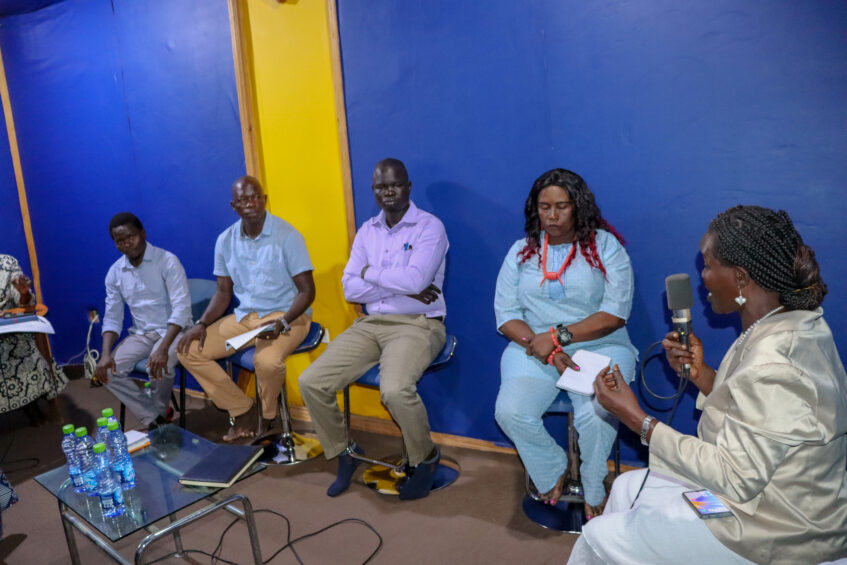
A focus group discussion on Eye Radio about the role of GBV court in Juba. (Photo: Awan Moses/Eye Radio).
Statistics from the Gender-Based Violence and Juvenile Court in Juba indicate that 9 out of the 91 percent of cases it has recorded are violence against men, as a group of advocates clarify that GBV is not only perpetrated against women.
The UN Development Program with support from the Kingdom of Netherlands, established the GBV and Juvenile court in December 2020, to try such crimes in Juba.
Counsel Gamma Hassen, the Legal Advisor for Steward Women, said the court was formed to speed up trial on the backlog of GBV cases which were highly prevalent.
“The GBV/Juvenile court was established as a special court so that these issues can be addressed faster compared to other issues. Gender-based violence or GBV is a harmful act towards a person based on their gender,” Gamma said.
“Most people think that the GBV court is for women only but that is not the case, it is for both men and women.”
He spoke during a focus group discussion on Eye Radio, about the role of the GBV/Juvenile Court located at Muduria area.
Mr. Gama said although cultural stigma has prevented men from speaking out against abuse by women, some have started coming out.
“Based on statistics at the GBV court, 91% of cases reported are by women and 9% were reported by men this indicates that men are also beginning to report violence perpetrated against them by women,” says Gama.
On his part, Advocate Taban Oliver from South Sudan Law Society, said the most common cases reported at the GBV court, are sexual offences like rape, adding that most victims are women and young girls.
Other cases reported include domestic violence, child custody issues after divorce, and juvenile cases involving gang groups.
Since its establishment in 2020, the GBV and Juvenile court has since tried over 160 cases.
“Community members should know that juvenile issues should not be handled by traditional chiefs, they should be taken to the juvenal court for the best interest of the child,” Oliver advised.
“At the traditional court, compensations can be paid but the child is not reformed,” he added.
Meanwhile, Sunday Mogga, Executive Director of Grassroots Women Network Organization said people with disabilities are sometimes wrongly accused of crimes.
“This include the case of a deaf person who was found at a scene of murder, but because he could speak for himself, he was arrested and could not receive a fair trial because there was no interpreter.”
Sunday further observed that some cultures play a negative role on issues of divorce, especially the refusal of some men to comply with the court directives.
“A man can just divorce his wife verbally, and when reported to the court, he will refuse to appear for the hearing. So, the case becomes difficult to resolve.”
Sunday called for more awareness on the process of reporting rape cases.
“This is because most people are ashamed to report a rape maybe because the perpetrator could be a family member,” she said.
Drabuga Dorothy, the Executive Director for Women Foundation for Humanity commended the GBV Court for delivering justice to victims of S-GBV.
However, Dorothy emphasized that more must be done in fighting the vice.
“So many people are not aware of this court, so partners should inform the public through the media about the free legal Aid services,” Dorothy said.
“For most people, when we talk of gender, they immediately think of women.”
“I think we should do awareness to let them know that when we are talking about gender, we are talking of the two sexes, men and women.”
“Gender Based Violence does not happen to women alone, but it also happens to men. People should really understand this.”
James Albino Chairperson of Gudele Block 6 said the government should address the underlying causes of GBV by controlling the flow of harmful substances into the country.
“Our cultures do not condone some of these behaviors such as consumption of destructive alcohol and other dangerous substances which is destroying our children.”
Responding to a question as to why sometimes the customary laws are preferred over the statuary law, advocate Gama Hassan said this is because national constitution gives the customary laws legitimacy.
“Our problem in South Sudan is that our law says something, but the people practice other things,” he said.
“Another problem is that our constitution recognizes the customary law as one of the sources of the laws, and that is why the customary is used in most cases.”
“But it is not supposed to be like that, because it has become parallel since the statutory and customary laws are both being used.”
Gama also said another issue that traditional chiefs sometimes judge cases that are beyond their jurisdiction.
“The issue is the chiefs who apply the customary laws do not know their boundaries, they do not know what the constitution says or what the penalty law says.”
“That is what causes the problem because they handle cases that are not in their jurisdiction. Most criminal cases are against the state and if it is a case of rape, the penalty is 14 years.”
“Even if you are the father of the girl, you can take the dowry, but the law will still take its course.”
“But most people do not respect the law and want to do things their way because he is the father and has the right to abolish the case.”
The advocates and activists were speaking at the discussion during the 16 Days of Activism Against Gender Based Violence.
The activists and advocates gave the following recommendations to improve the GBV court.
.
Support Eye Radio, the first independent radio broadcaster of news, information & entertainment in South Sudan.
Make a monthly or a one off contribution.
Copyright 2024. All rights reserved. Eye Radio is a product of Eye Media Limited.